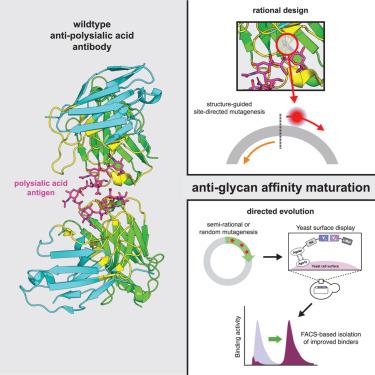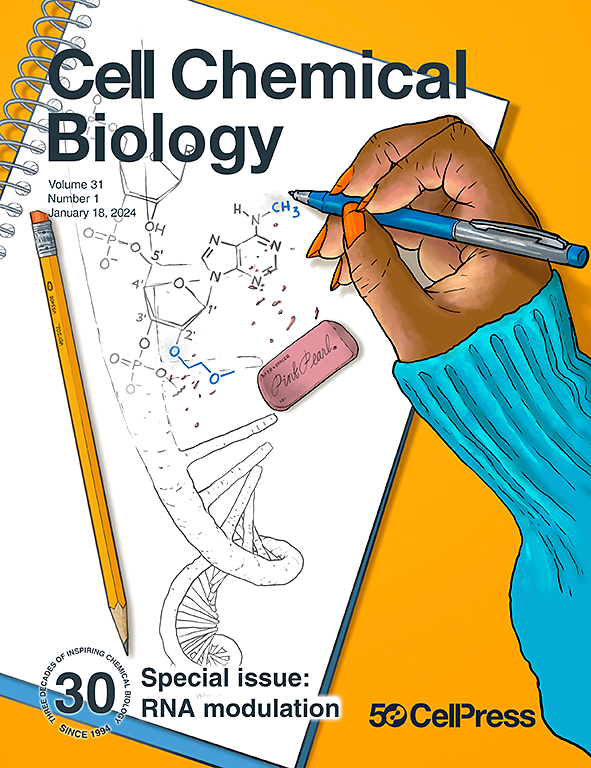具有优越细胞毒性介导效力的抗多唾液酸单克隆抗体的工程亲和成熟变体
IF 7.2
1区 生物学
Q1 BIOCHEMISTRY & MOLECULAR BIOLOGY
引用次数: 0
摘要
单克隆抗体(mab)是一种特异性识别与癌症和传染病相关的细胞表面聚糖的抗体,在基础研究和临床应用中具有巨大的价值。然而,具有足够高亲和力和特异性的高质量抗聚糖单克隆抗体仍然稀缺,这突出了对优化抗原结合特性的策略的需求。为此,我们设计了一种聚唾液酸(polySia)特异性抗体mAb735的亲和力,该抗体仅具有适度的亲和力。通过合理设计和定向进化的结合,我们分离出了几种亲和成熟的IgG变体,它们对polySia的亲和力比mAb735强5到7倍。高亲和力的IgG变体更强烈地活化多囊性阳性癌细胞,并引发更大的抗体依赖性细胞介导的细胞毒性(ADCC)和补体依赖性细胞毒性(CDC)。总的来说,这些结果证明了分子进化技术在一种重要的抗聚糖抗体上的有效应用,提供了对其碳水化合物识别的见解,并发现了由于其增强的亲和力和效力而具有更大治疗前景的变体。本文章由计算机程序翻译,如有差异,请以英文原文为准。

Engineering affinity-matured variants of an anti-polysialic acid monoclonal antibody with superior cytotoxicity-mediating potency
Monoclonal antibodies (mAbs) that specifically recognize cell surface glycans associated with cancer and infectious disease hold tremendous value for basic research and clinical applications. However, high-quality anti-glycan mAbs with sufficiently high affinity and specificity remain scarce, highlighting the need for strategies that enable optimization of antigen-binding properties. To this end, we engineered the affinity of a polysialic acid (polySia)-specific antibody called mAb735, which possesses only modest affinity. Using a combination of rational design and directed evolution, we isolated several affinity-matured IgG variants with ∼5- to 7-fold stronger affinity for polySia relative to mAb735. The higher affinity IgG variants opsonized polySia-positive cancer cells more avidly and triggered greater antibody-dependent cell-mediated cytotoxicity (ADCC) and complement-dependent cytotoxicity (CDC). Collectively, these results demonstrate the effective application of molecular evolution techniques to an important anti-glycan antibody, providing insights into its carbohydrate recognition and uncovering variants with greater therapeutic promise due to their enhanced affinity and potency.
求助全文
通过发布文献求助,成功后即可免费获取论文全文。
去求助
来源期刊

Cell Chemical Biology
Biochemistry, Genetics and Molecular Biology-Molecular Medicine
CiteScore
14.70
自引率
2.30%
发文量
143
期刊介绍:
Cell Chemical Biology, a Cell Press journal established in 1994 as Chemistry & Biology, focuses on publishing crucial advances in chemical biology research with broad appeal to our diverse community, spanning basic scientists to clinicians. Pioneering investigations at the chemistry-biology interface, the journal fosters collaboration between these disciplines. We encourage submissions providing significant conceptual advancements of broad interest across chemical, biological, clinical, and related fields. Particularly sought are articles utilizing chemical tools to perturb, visualize, and measure biological systems, offering unique insights into molecular mechanisms, disease biology, and therapeutics.
 求助内容:
求助内容: 应助结果提醒方式:
应助结果提醒方式:


